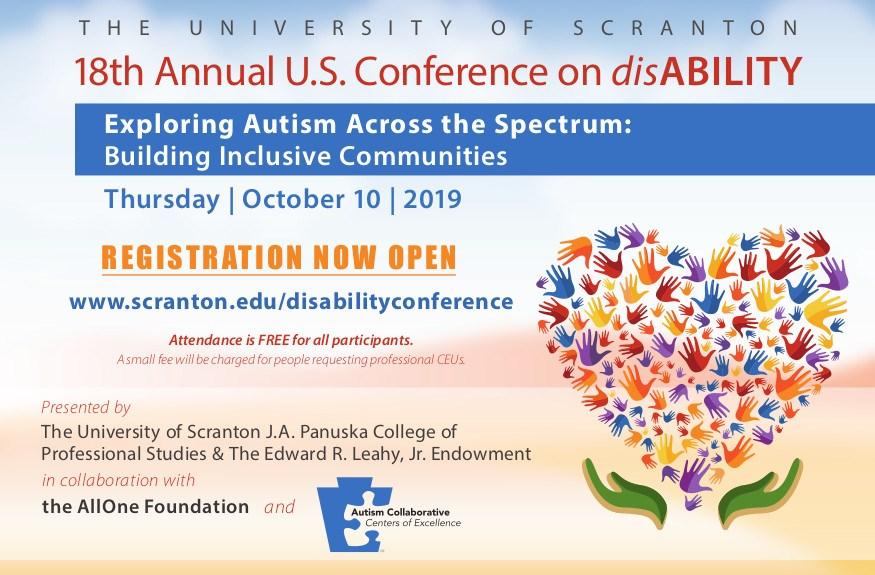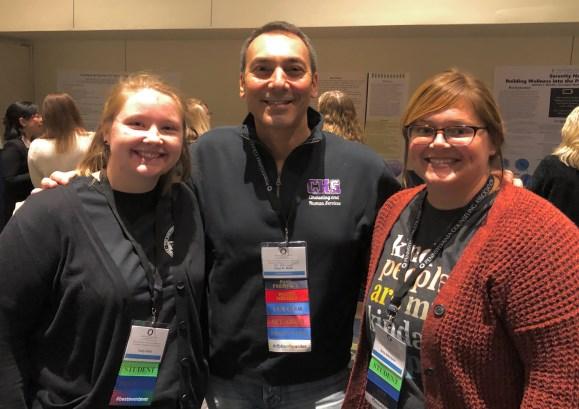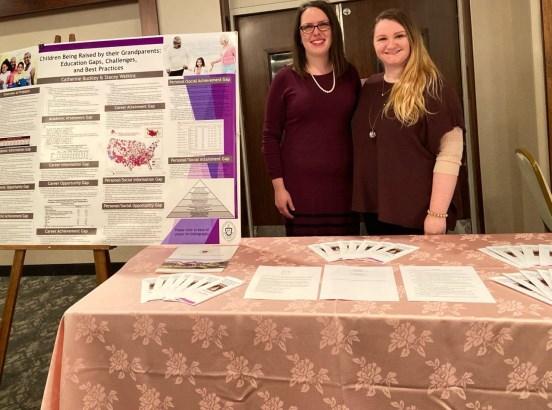
24 minute read
CHS
V O L U M E 1 1 , I S S U E 2 1
Counseling and Human Services
Why is gratitude important for Mental Health?
That’s an easy question. According to Carpenter (2019), “People who regularly practice gratitude by taking time to notice and reflect upon the things they're thankful for experience more positive emotions, feel more alive, sleep better, express more compassion and kindness, and even have stronger immune systems” (para. 1). So, how about that? There is science related gratitude, and it shows that there are significant positive mental health effects! In fact, according to psychologist Robert Emmons (2008), consistent and intentional gratitudecan increase happiness by as much as 25 percent! So, take a moment each day and think about for what and whom you are grateful…
Another easy question. As a person blessed with health, love, vocation, and family, there is no lack of gratitude in my life. Often, if not each day, I consider all the wonderful things life offers and think about how grateful I am to have them…and at the same time consider those who do not have such blessings. The latter more so than the prior is what helps propel me to be a man for and with others, as Ignatius teaches us.
Dr. Datti, CHS Program Director
Why is gratitude important for mental health?
I believe that gratitude is important for mental health because it allows us to take inventory of the sources of happiness we have in our lives, no matter how large or small they may be. If we don't take the time to acknowledge these positive things in our lives, it can be very easy to become wrapped up in the negatives, which in turn can be detrimental to our mental health. I think it is important to take a step back every now and then from the immediate moment and appreciate your journey.
How do you incorporate thankfulness and gratitude into your everyday life?
I try to practice a lot of self-reflection, not necessarily in a formal way, but just thinking about where I am currently at. I read a quote recently that said something along the lines of "you once dreamed about being where you are now," and I think that can be conceptualized in many ways. For example, when I find myself wrapped up in the stress of internship and classes, I think about how being a college student and fully engaging myself in a field that I love is something I always wanted as an adolescent. My "future plan" in my high school yearbook was actually to find a job in a field that I love, and I know that I have definitely found this field through the counseling department. While it's easy to become overwhelmed with internship hours and upper-level course work, I try to remind myself that this is exactly where I am meant to be and that the stress can be managed. Conceptualizing my current position in terms of my younger self helps me to be so thankful for all of the amazing opportunities I have been afforded, and for all of those opportunities yet to come.
Meghan Pratt, CHS Internship Student
Why is gratitude important for mental health?
A significant part of working on one’s mental health is establishing a positive attitude and mindset. This is where gratitude comes in, focusing on things one is grateful for can help shift their mindset to become more positive, which can be very impactful when a person has known nothing but negative thinking for so long. While one cannot wish the negative aspects of their life away, the way in which one perceives their life can make a huge difference on their mental health. Gratitude is helpful in this way because it encourages one to focus on the positive aspects of their life, regardless of how many negative aspects there may be.
How do you incorporate thankfulness and gratitude into your everyday life?
Each day I try to think of one thing that my life would be different without, and one thing that my day would have been different without. Identifying one thing my life would be different without, reminds me to be especially thankful for those "guaranteed" aspects of my life. Doing this keeps me grounded and reminds me that the aspects of my life I subconsciously consider basic or standard, are not so for so many others in our world. Thinking about one thing my day would have been different without reminds me to be grateful for every positive aspect of my life no matter how small. The girl from class who bonded with me over our shared stress of the semester and made me feel less alone, sharing a well needed laugh with a coworker, getting a "thinking of you" text from a high school friend or relative about a memory that made them smile. At the end of a particularly difficult day, these small habits allow me to use gratitude as a tool to achieve a more positive outlook and put things into perspective when it seems like the negatives of life are starting to permeate my thinking and attitudes.
Carly Dugan, CHS Student
Counselor Training Center
How is gratitude important for mental health?
Without gratitude the negativity that we encounter can take up long term residence in out mind, hearts and spirits. This might be the definition of long term stress and distress. While we focus on the things that are hard or painful, giving some space and time to those things that we are grateful for (however small sometimes) can aid in creating balance. Balance is a foundation to build wellness. Gratitude can shift perspective: it's important.
How do you incorporate thankfulness and gratitude into your everyday life?
I routinely ask myself at the end of the day, What have I seen, heard or experienced today that has been "life-giving"? In effect I am asking what am I thankful for, big or small. It is important to me that that I end the day cognizant of the many gifts and blessings I have. Love, life itself, laughter, hot coffee, and adorable dogs to name a few. Certainly this is harder on some days than others as not everyday is a "great" day and yet on those days that are less than stellar I dare say, the question and subsequent answer becomes even more important. Perhaps most importantly is that I try everyday (emphasis on try) to takeor make opportunitiesto let people in my life know they matter and I am grateful for and to them.

Geri Barber, Program Director
How is gratitude important for mental health?
Human beings will experience pain and strife --the difference is how you let it define you. In counseling, we often work with the belief that so much about our lives and experiences is dictated by how we perceive it - whether that be behavior or emotion. Either way, gratitude is a strength that promotes resilience and healing in our clients by creating meaning from struggle. Gratitude allows us to feel thankful for the lessons and revelations learned from difficult experiences. It also provides the opportunity for an individual to feel gratitude toward themselves for making it through their situation.
How do you incorporate thankfulness and gratitude into your everyday life?
When I am feeling anything but thankful I have come to realize that often means I am most in need of gratitude. As humans, we often get caught up in every day and do not take the time to reflect on every happening within each day. In a day that I experience a difficult situation at work, I am inclined to forget how good that coffee I got that morning. I have learned to recognize this, and strive to be thankful for all aspects of the day, rather than only remember the negative. No matter what, there’s at least one part of your day to be thankful about that will make all the difference --even if it just a good cup of coffee.
Bridget Kolf,
Practicum Student
How is gratitude important for mental health?
There are many benefits to gratitude, especially when it comes to mental health. Practicing gratitude can help us be aware of the things we love and can help us feel more positive emotions. Gratitude helps us find things to be grateful for, no matter how big or small. The more grateful we feel, the better we can be in all aspects of life.
Each day I try to find at least one thing I am grateful for, and each day I have been able to find something. I try to focus on the good and be thankful for the little things. We live in a beautiful world filled with life of all sorts, and to me that is a blessing in and of itself!

Abigail Rieder, Practicum Student
Recent Graduates
How is gratitude important for mental health?
Gratitude, to me, is about being thankful for all and everything that you have and are given. It’s about showing our appreciation for others in a way that is truly meaningful and comes from within. Our gratitude can be radiated into the lives of others, simply by being thankful and showing kindness which can have a great impact on our mental health. Showing and expressing gratitude can give others and ourselves a sense of positivity. The uplifting, positive emotions that feed into our mental well-being gives us a sense of purpose and drive that can make all the difference in one’s mental health. As a future counseling professional, I think that it is important to radiate thankfulness and gratitude to the individuals we work with and the individuals we provide services to. By expressing our gratitude, we can show others how important they are to us, and we can show them the ways in which they contribute to the world.
How do you incorporate thankfulness and gratitude into your everyday life?
In my everyday life, I try to show gratitude and thankfulness to others in everything I do. Whether it’s simply holding a door or sharing a smile with someone, I try to radiate positivity into other’s lives through simple, normal tasks. You really do not know what could be going on in another stranger’s life, and just being there for someone and being present allows gratitude to flourish into a lifestyle. A smile is such a small thing, but can mean so much to someone else, and I try to live my everyday life with that mindset. Over the summer I started writing down things that I have in my life that I am thankful for, and that alone has allowed me to find deeper appreciation of the things and the people I am surrounded by in my life. Even if it’s just the small, miniscule things that make me happy to the major things in my life that I am grateful for, I write it down. I have so much to be thankful for in my own life and being able to recognize that and show appreciation for it has truly given my life a profound sense of meaning and purpose.

Rachel Kollar, CHS Graduate
How is gratitude important for mental health?
Mental health is composed of many different aspects, but what I have found working in mental health is how easy it is to get overwhelmed by the things we feel like we have to do instead of focusing on the fact we get to do those things. When you can slow yourself down, be present in the moment, I think gratitude becomes easier to see. We rush from projects to events to things we forget we put on our calendar, and we suddenly forget about the amazing-ness of the fact that the sun comes up each morning.
In my daily life, I often try to think about the seemingly small things I am grateful for that I sometimes take for granted, such as a good cup of coffee, pens that write well or the perfect parking space. I am a really big believer in Abraham Hick's quote, "When you focus on the good, the good gets better". I choose each day to be thankful for the small things, because they hold such power to turn into the big things.
Bridget Furdon, CMHC Graduate
How is gratitude important for mental health?
Framing our past through feelings of gratitude is a wonderful way to self-reflect and re-experience emotions in a healthy way. Both fond and painful memories could be revisited with a new level of positivity if gratitude is the focal point.
Like many others, life challenges distract me from regularly reflecting on who and what I am thankful for. Keeping small mementoes on my desk, in my car, and around the house serve as reminders so when a hectic day takes over, a quick glimpse of a special keepsake helps me to think, feel, and appreciate. Douglas Rand, Rehabilitation Graduate
Events
DisAbility Conference

The Conference on DisABILITY was a wonderful experience. Since autism is a spectrum disorder, I loved that the speakers were all on different parts of the spectrum. I believe that this helped myself and others to have a better understanding of the condition. Throughout the conference, there was a continued emphasis on ability rather than disability. Jose Velasco and his mother, Deya, spoke about Jose’s employment with the Internal Revenue Service as well as his journey to becoming an Eagle Scout. Kerry Magro, who is a best-selling author and professional speaker, spoke about his experience with autism and his continued efforts to raise disability awareness. Lastly, Jeremy Sicile-Kira’s presentation displayed his ability to paint beautiful works of art. Each of these inspiring stories demonstrated that everyone has the ability to flourish, and rehabilitation professionals should always have the goal of helping individuals to reach their fullest potential.
By: Shaina Shelton
Internship Fair

On October 24th, 2019 the CHS Internship Fair was held. The purpose of the internship fair was to assist undergraduate and graduate students in communicating with community agencies and organizations for potential internship opportunities. The event provided students with an opportunity to create open discussions and explore internship options that representatives have available. Students who attended were able to learn about a variety of internships that would allow them to apply their counseling skills in different ways to gain real world experiences.

By: Shelby Valvano

Honor Societies and Clubs
Chi Delta Rho has spent the semester planning and gearing up for some great events! We are seeking to launch a service, fundraising, and social event this academic year, and our board has been busy planning and collaborating. Stay tuned for updates!

Chi Delta Rho
Written by: Sarah Frederick
TUA
This semester in collaboration with CHSA, TUA hosted an internship fair specifically for counseling students, in which 15 local human services agencies came to engage with students about potential internship or volunteer opportunities. This fair was a huge success with over 40 CHS students of all grades attending, and many who left with interviews or internships set up. Written by: Carly Duggan
(Leah Talarico, Vice President & Dr. Cerrito, faculty advisor)

CHSA

This semester CHSA participated in a variety of service events that helped to engage many of our new members. Starting in October we participated in Street Sweep, assisted with Love Your Body Day, held our very own internship fair, and held a club service event in which we created over 50 cards for the veterans in the Gino Merli veterans center! For our last event 15 of our members participated in a Safe Zone training specifically for CHSA, which was a great way to increase our competencies and get to know each other better! Written By: Carly Duggan
Student Accomplishments
Rose Kelly Award

TheRoseKellyAward was established by a University of Scranton Alumnus, Joseph Wineburgh, Ph.D., to link the efforts of educators to the achievements of college students. Dr. Wineburgh established the program to honor an elementary teacher,RoseI. Kelly, who greatly influenced his life. It is an award presented jointly to a student in each undergraduate college who has completed two years at the University (currently a junior) and to the teacher who the student recognizes as having had a great impact on the student’s life. The student selected by each college will have demonstrated exemplary achievement in both academics and in general campus involvement.
Congratulations Diana Valentina Mesa on all your hard work and dedication!
Students, Amy Atkinson, and Carly Deitz presented alongside Dr. Datti at the Annual PA Counseling Association fall conference in State College.


Dr. Willis and Abigail Rieder presenting at Pennsylvania Counseling Association’s 51st Annual Conference titled “Wellness in Counselor’s Professional and Self Identity” Anthony Savercool, Leah Talarico, and Dr. Willis presented at the Pennsylvania Counseling Association’s 51st Annual Conference titled “Wellness in Counselor’s Professional and Self Identity” Catherine Buckley and Stacey Watkins presented at the Woodland’s 13th Annual Grandparents Raising Grandchildren conference.
What’s happening in CHS?
Effective in Fall 2018, we welcomed Dr. Troy to the CHS Department. We are so excited to have been able to work with her and we are thankful to have you!
#ScrantonCHS
Follow us on Instagram!
Welcome Dr. Sonja Lund!
Effective in Fall 2019, we welcomed our newest professor to the CHS Department. We congratulate you on your new position and we look forward to having you as part of the CHS team.
Effective in Fall of 2019, Dr. Bordonada was promoted to Co-Director of the Clinical Mental Health Program. We congratulate Dr. Bordonada on her promotions and we are lucky to have you!
Congratulations to Dr. Morgan on his new book “Addiction, Attachment, Trauma and Recovery : The Power of Connection”.
Understanding addiction is no longer just about understanding neurons or genes, broken brain functioning, learning, or faulty choices. Oliver J. Morgan provides a fresh take on addiction and recovery by presenting a more inclusive framework than traditional understanding. Cutting-edge work in attachment, interpersonal neurobiology, and trauma is integrated with ecological-systems thinking to provide a conciliant and comprehensive picture of addiction. Humans are born into connection and require nourishing relationships for healthy living. Adversities, however, bring fragmentation and create the conditions for ill health. They create vulnerabilities. In order to cope, individuals can turn to alternatives, “substitute relationships” that ease the pain of disconnection. These can become addictions.

Addiction, Attachment, Trauma, and Recovery presents a model, a method, and a mandate. This new focus calls for change in the established ways we think and behave about addiction and recovery. It reorients understanding and clinical practice for mental health and addiction counselors, psychologists, and social workers, as well as for addicts and those who love them.
V O L U M E 1 1 , I S S U E 2 1
Professional Achievements/Conferences
PUBLICATIONS
Datti, P. A., & Conyers, L. M. (2019, in press). Examining differences of human service utilization among Latino men living with HIV and varied racial identifications. Journal of Human Services, TBA.
Datti, P. A. (2019). Human serviceconsiderations for LGBT+ clients living with HIV. Conference Proceedings: 2018 National Organization for Human Services, 2018, 18-30.
Feather, K. A., Bordonada, T. M.,Nelson, K. A., & Evans, K. (2019) Social justice training: An innovative certificate program for counselor education. Teaching and Supervision in Counseling, (1)1, 67 –84. Limberg, D. H., Ohrt, J. H., Carlson, R. G., Bordonada, T. M.,Bates, D., Wymer, B., & Guest, J. (2020) School Counselors: Experiences and Responses During the South Carolina 1,000 Year Flood. Professional School Counseling, 23(1),1 –10. Lund, S. (2019). A Comparison of College Student-Athletes With Attention-Deficit Hyperactivity Disorder (ADHD) and Nonathletes With ADHD: Academic Adjustment, Severity of Mental Health Concerns, and Complexity of Life Concerns. (Unpublished doctoral dissertation). Counseling and Human Services, Old Dominion University. doi:10.25777/85vd-yr45
Morgan, O. J. (2019). Addiction, attachment, trauma, and recovery: The power of connection. New York, NY: W.W. Norton & Company.
Purswell, K. E., Willis, B. T., & Lara, A. (2019). Counselor development across the lifespan: A Q-methodology study. Journal of Counselor Leadership and Advocacy, 6, 1-15. doi:10.1080/2326716X.2019.1628674
PRESENTATIONS
Atkinson, A., Deitz, C., Hernandez, V., & Datti, P. A. (2019, November -accepted). LGBTQ+ military affiliated persons: Understanding implications for counselors. Presentation to be provided at the Annual Pennsylvania Counseling Association fall conference, State College, PA. Cerrito, J. A. (2019, June). Fit for the future: Increasing child career readiness with innovative interventions. Paperpresented at the meeting of the National CareerDevelopment Association Annual Conference, Houston,TX. Cerrito, J. A. (2019, June). Selected for participation in theCounselor Educator Academyat the National Career Development Association, Houston, TX. Charette, J., Connell, A., Datti, P. A., Gruber, R., & Petitto, D. (2019, November -approved). Being LGBT+ in today’s social and political climate –advancements, challenges, and counseling implications. Half-day pre-conference institute to be provided at the annual Pennsylvania Counseling Association fall conference, State College, PA. Datti, P. A. (2019, March). Examining differences in human service utilization among Latinx Men living with HIV and varied racial identifications. Research presentation at the Mid-Atlantic Consortium on Human Services, York, PA.
Professional Achievements/Conferences
PRESENTATIONS CONTINUED...
Feather, K. A.,Bordonada, T. M.,& Linich, K. (2019, October). An Initial Investigation of Individual Instructors’ Self-Perceived Competence and Incorporating Disability Content into CACREP Accredited Programs: Rethinking Training in Counselor Education. Presented at the Association for Counselor Education and Supervision Annual Conference, Seattle, Washington.
Purswell, K. E., & Willis, B. T. (2019). Does counselor students’ development align with the Rønnestad and Skovholt’s LDM Model?: Data from an initial collection and a one-year follow up. Accepted to be presented at the Association for Counselor Educators and Supervisors Biannual Conference. Seattle, WA. October 2019.
Reider, A., & Willis, B. T. (2019). Enhancing the wellness of caregivers of people with dementia and Alzheimer’s Disease. Accepted to be presented at the Pennsylvania Counseling Association Annual Conference. State College, PA. November 2019.
White, D., & Willis, B. T. (2019). Discussion disruptors. Invited presentation for Parker Hill Church small group leaders. Dickson City, PA. September 8, 2019.
Willis, B. T., Talarico, L. G., & Savercool, A. C. (2019). Understanding and working with identity to enhance wellness. Accepted to be presented at the Pennsylvania Counseling Association Annual Conference. State College, PA. November 2019.
Willis, B. T. (2019). Identity, identity, so many identities!: Using creative ways to help students/ supervisees to understand identity and identity development. Accepted to be presented at the Association for Counselor Educators and Supervisors Biannual Conference. Seattle, WA. October 2019.
Willis, B. T. (2019). Personality disorders. Invited presentation for Marworth Treatment Center clinical staff. Waverly, PA. September 11, 2019.
WHAT TO LOOK FORWARD TOO
“I have a revised chapter appearing in Winter 2019, title “12 Step Spirituality,” with Dr Keith Morgen. The chapter will appear in the 3rd edition of Integrating Spirituality and Religion into Counseling: Guide to Competent Practice by Cashwell & Young (ACA Press)” -Dr. Morgan
PRESENTATION EXPERIENCE
“I recently (9/28) presented at the European Branch of the American Counseling Association Conference in Vienna, Austria. I presented with my colleague Dr. T’Airra Belcher who teaches at the University of Loyola in New Orleans. Here is a picture of us at our presentation and a picture of us in front of St. Stephen’s Cathedral (one of the city’s most recognized symbols).” –Dr. Lund

We asked our faculty to tell us, “If you could time travel, where would you go?” Dr. Bruch-“I wouldn't time travel, I would stay and enjoy the present! Dr. Willis-“I would love to see what the current US would look like before European settlers came here in the late 1400s.” Dr. Troy–I would travel back to 1787 to watch the drafting of the US Constitution. Such an important and fascinating process to understand. Dr. Datti–“I would travel back 100 years to wherever and freak everyone out with my cell phone.” Dr. Morgan- “If I could time travel I would love to go back to 1935 so that I could meet Bill W, Dr Bob, and Fr Dowling -all co founders of Alcoholics Anonymous.” Dr. Wilkerson-“I would travel FAR into the future. I would like to see how the world looks 100+ years down the road and get a chance to see how we did in the present.” Dr. Cerrito-Back to childhood -such a fun and simple time in life! Dr. Eschbach–“I would go back in time to the 1940s when my Grandmother started Eschbach Park (over 100 acres) to be a part of the dance hall where "big bands" played, and to help the way my Dad, Aunts, and Uncles did.” Dr. Bordonada- I want to travel anywhere that includes wearing sunglasses and lots of SPF for my everyday attire! Dr. Jensen-If I could time travel, I would go back to my childhood years (between the ages of birth to 12 years old) so I could once again enjoy that time with my grandmother, Kathleen. Dr. Lund-If I could time travel I would go all the way back to around the 1770s when my favorite composer, Mozart, was alive. I would love to hear his works exactly as he meant for them to be performed. I learned so much about him during my Vienna trip and he truly was a musical genius!
PCPS Contact List
Name
Debra Pellegrino, Ed.D Dean, PCPS Lori A. Bruch, Ed.D, CRC, LPC, Department Chair Gerianne Barber, MS, NCC, LPC, CRC, CTC Director Julie Cerrito, Ph.D, NCC, NCSC, SC Director Rebecca Spirito Dalgin, Ph.D, CRC, CPRP, RC Director Paul Datti, Ph.D, CRC, HS-BCP, CHS Director Ben Willis, Ph.D, NCC, ACS, CMHC Director Tiffany Bordonada, Ph. D, CMHC Director
Phone
570-941-6305 570-941-4308 570-941-7635 570-941-4163 570-941-7819 570-941-4127 570-941-6172 570-941-7487
Newsletter Staff: Faculty Advisor: Dr. Mary Troy Student Editors: Kaitlin Lambert and Shelby Valvano Office
ELH226 MGH455 MGH433 MGH447 MGH437 MGH451 MGH441 MGH443
CRC
Certified Rehabilitation Counselor (CRC) The CRC credential is specific to Master’s of Rehabilitation Counseling. The passing of this exam ensures that the counselor fits in nationally with the key competencies for the field. Possessing this credential makes a Rehabilitation Counselor more marketable and distinguished among other counseling professionals. This credential also demonstrates one’s commitment to learning through education, trainings, and practice. The credential can also lead to job placement, advancement in the position or salary, and referrals from medical and non-medical professionals. For more Information about the exam and benefits of the credentials please see https://www.crccertification.com/about-crc-certification .
NCE
National Counselor Examination for Licensure and Certification This exam is used to assess the knowledge, skills, and abilities that are required for effective counseling. Passing the NCE is a requirement in many states and used in military health system services. Passing is also needed to get the National Certified Counselor (NCC) credentials. The NCC is the largest national counselor certification in the world. There are specialty certification is addictions, school counseling and clinical mental health as well. For more information about this exam, the benefits, and the difference between a national certification and state licensure, please see http://nbcc.org/Certification/CertificationorLicensure .
HS-BCP
Human Services Board Certified Practitioner (HS-BCP) Graduates of the CHS program are eligible to sit for the Human Services - Board Certified Practitioner (HS-BCP) exam to receive the HS-BCP credential. The credential allows for independent verification of practical knowledge and educational background in human services. With increased competition in this growing field, becoming board certified in human services shows attainment of high standards and allows you to stand out as a part of a distinguished group known for commitment to maintaining excellence in the field. With the number of human services jobs expected to climb rapidly this decade, the HS-BCP credential can help launch a rewarding career. Note that this is one of the very few credentials offered at the undergraduate level. Because of our program's accreditation status with CSHSE, University of Scranton CHS majors who have 15 credits or less to complete are eligible to apply for the credential and sit for the examination prior to graduation. Please see the Center for Credentialing Education’s (CCE) website for more information on the credential and exam:http://www.cce-global.org/HSBCP.



